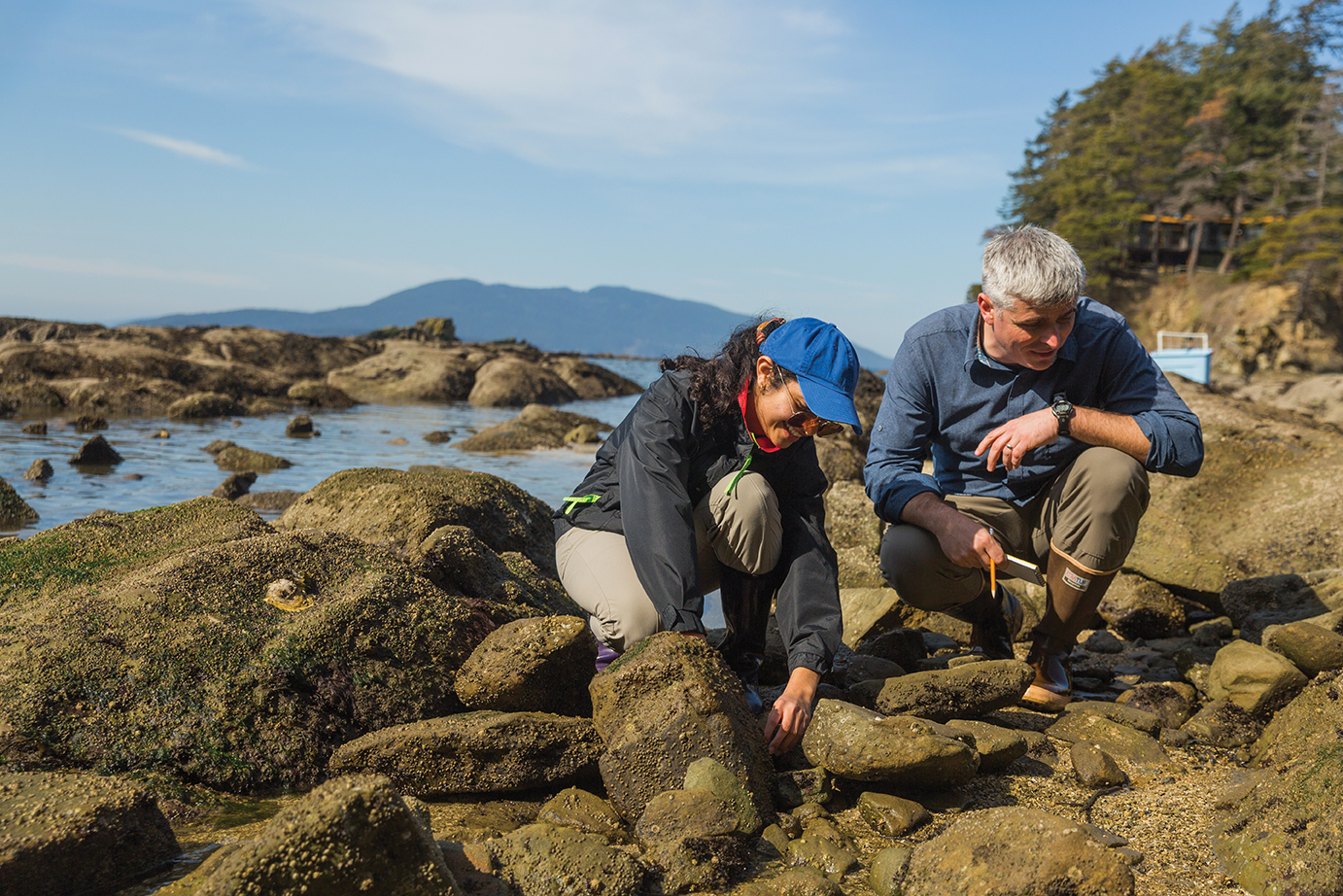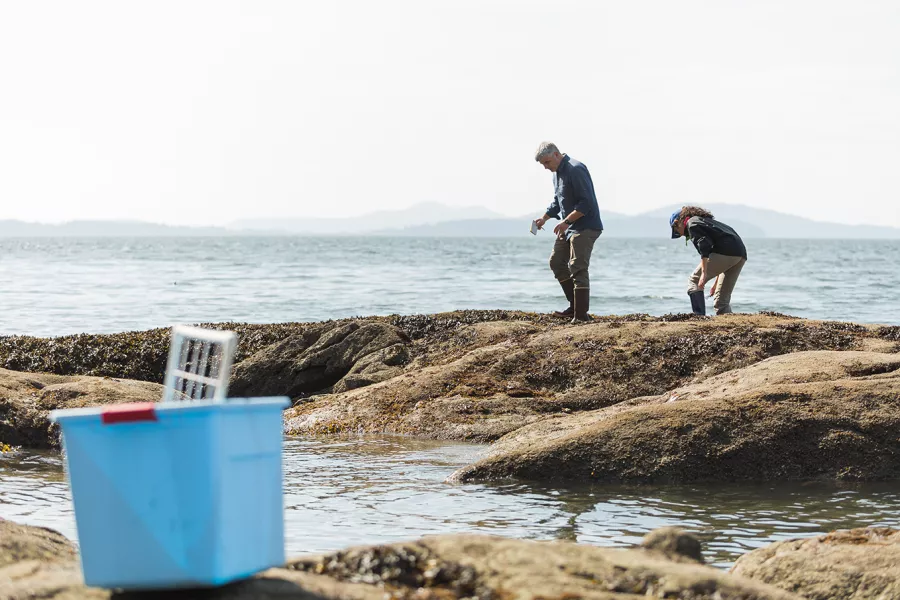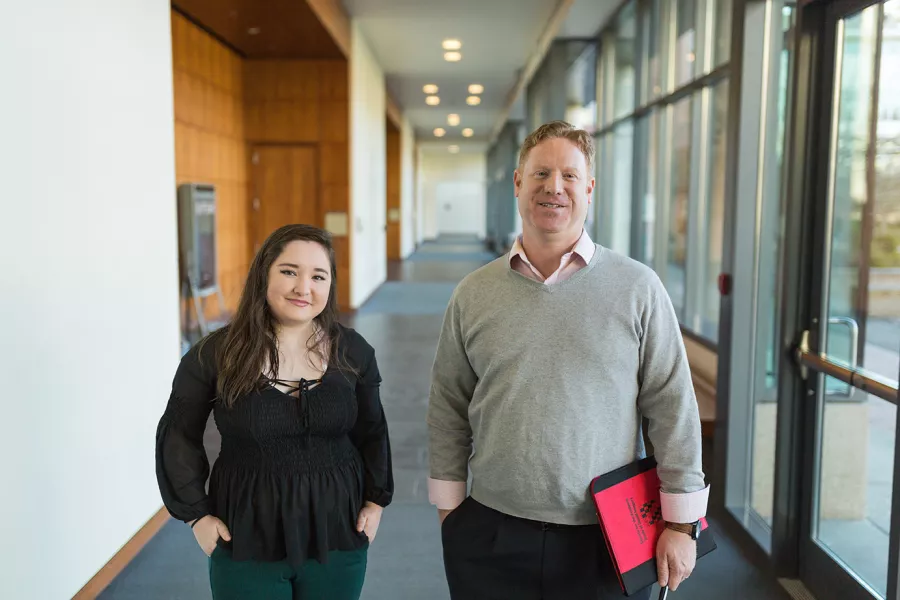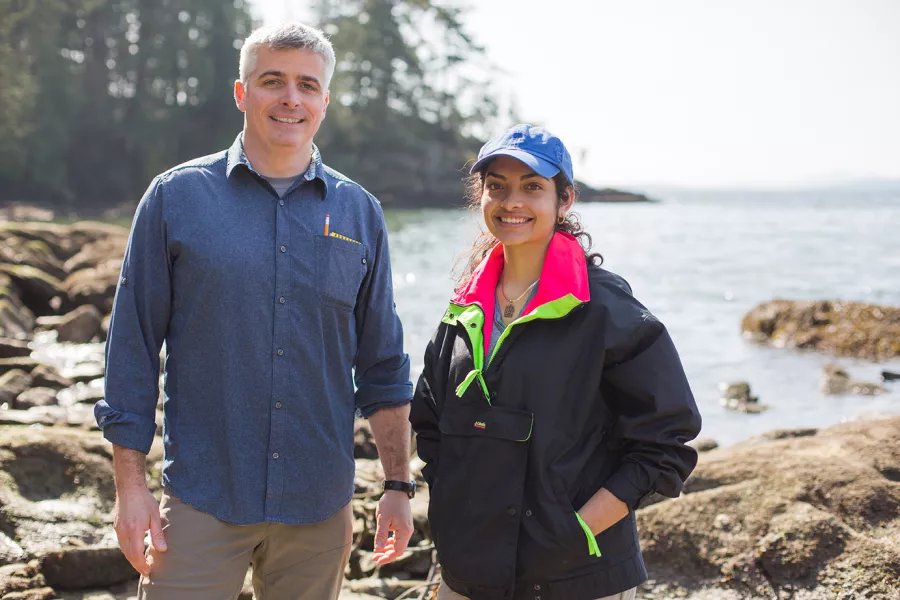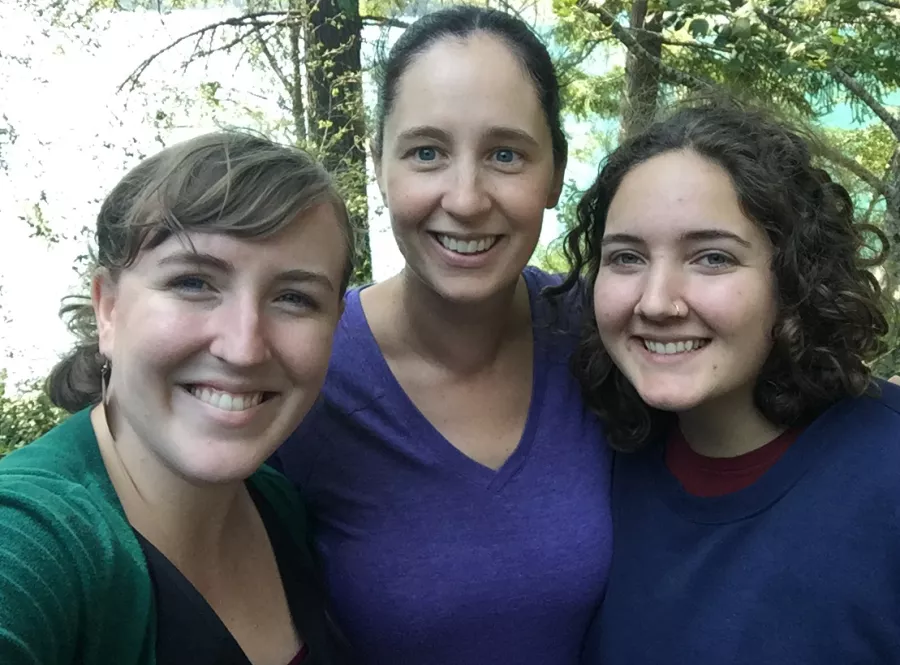“I cry every time I watch this,” says WWU Assistant Professor of Environmental Sciences Marco Hatch.
Hatch, a focused, serious man with an easy smile and an obvious passion for his work, hits "play."
The video begins and runs for just a few seconds before Hatch hits “pause.”
“Yep,” he says, his eyes reddening just as the subject of the video, Environmental Sciences student Celida Moran from Hatch’s coastal ecology lab, walks into his office with a smile bright enough to light up the room.
The video that brings Hatch to tears is Moran’s presentation from last summer at the University of Washington, where she had just completed the first half of a prestigious two-year Doris Duke Conservation Scholars Program fellowship, doing field-work across the state, from the mudflats of Skagit County’s Padilla Bay to the crags and valleys of the Olympics. In the video, Moran talks about who she is, where she came from, and how hard it has been at times to be a person of color in a field dominated, more or less, by people who don’t look like her.
“She spoke her truth,” Hatch says. But for Moran, it goes deeper than that.
“Most likely, I wouldn’t still be in Environmental Sciences if it wasn’t for Marco. I wouldn’t have gotten the Duke fellowship if it wasn’t for Marco,” Moran says. “But most importantly, I probably wouldn’t have had the confidence in myself to say those things in the video without his mentorship and faith in me.”
Moran says Hatch works tirelessly to build community within Huxley’s Coastal Communities and Ecology Lab and as a faculty adviser to Western’s chapter of SACNAS, the Society for Advancement of Chicanos/Hispanics and Native Americans in Science—from hosting potluck dinners where the students can talk about anything but school, to facilitating tough discussions about racism and bias within the scientific community.
“He remembers what it was like to be an undergraduate, and he knows that (including) a broad mix of students in his lab just creates a richer environment for everyone,” she says.
Moran recounted when, after an electrical fire swept through her rental house, Hatch was among the first to offer assistance, and his truck, to help relocate the students.
“His attitude was just basically ‘Let us know what you need.’ And he kept following up, and he would have done that for any of us. That’s just who he is,” she says.
While reflecting on his role as mentor, Hatch recalled a personal story about a beautiful woven cedar clan basket, given to him by Bill James, master weaver and hereditary chief of the Lummi Nation, and Lummi member Troy Olsen.
“They told me that it wasn’t something just to put some-where and admire—it was something I had to actually use. The gift came with the obligation to use it, it was created for a purpose, and the way you pay homage to its creator is by using it for that purpose,” says Hatch, who taught at Northwest Indian College before he came to Western and is a member of the Samish Indian Nation.
“Mentoring and my relationships with my students have that same kind of sense of purpose. I provide a level of support to them that I feel obligated to provide, because that support was given to me when I was their age,” he says. “And when I see Celida taking on that role of providing support to the new students in this lab, I know she feels the same way … which is how we build a mutually supporting community of scholars.”
That, in a nutshell, lies at the core of what so many Western students and faculty say is the beating heart of any mentor/men-tee relationship: that both sides come away richer, having gained in the process.
“She absolutely shifted the way I think about my education”
When Fairhaven Associate Professor Hilary Schwandt was looking to continue her research into reproductive health and reproductive rights in Central Africa, she knew that involving her undergrads in Fairhaven College of Interdisciplinary Studies would only make the work stronger and give it a more distinctive voice.
“Students do that,” she says. “Their thoughts and their input take something good, and make it better.
“Unfortunately, students also tend to totally undersell them-selves in regards to what they are capable of doing and bringing to the table in terms of research.”
Two of Schwandt’s students, Abigail Miller and Madi Stapleton, could only nod their heads and laugh at Schwandt’s point.
“I knew almost nothing about qualitative research before we went to Rwanda in 2018,” says Miller of Port Angeles, now a veteran of two trips to Rwanda, the first for research into the country’s state-of-the-art family planning programs and the second to present the results of that research at a national conference.
“I didn’t know how messy it can be. There are communication and language problems. There are connection difficulties. There are so many roadblocks to getting the data you need that you have to navigate. In the end, you just have to learn to roll with the realities of what is around you, and do your job,” she says.
“And to know that Hilary was so solidly behind us, encouraging us as we sort of wound our way through the learning curve, was really the only thing that made it all possible. It was a steep hill to climb. But that’s what a good mentor does: She had higher expectations for me than I had for myself.”
Looking back on those two trips, Miller says it was always her goal to find a mentor within Fairhaven, but that her relation-ship with Schwandt has grown into so much more than that.
“I never thought I would end up with not just a mentor but a lifelong friendship,” she says, looking out the window at the woods surrounding Fairhaven and the students walking down its gravel paths on their way to class. “I’ve achieved so much more here than I ever thought I could.”
Stapleton agreed, saying that Schwandt’s inclusion of them in her research has created a relationship and collaboration that she didn’t even know was possible when she first came to college.
“Mentorship—real mentorship—is a long-term thing that goes far past any one class,” says Stapleton, a Fairhaven College student from Kansas City, Kansas. “She was so confident in us, and so sure that we would grow. And we did. She absolutely shifted the way I think about my education, and I feel like so many new doors are open to me now.”
In fact, Stapleton says the research collaboration with Schwandt has been so fruitful that she can now see herself staying in the field and working toward a doctorate of her own.
“That opportunity to collaborate with Hilary has given my education such an incredible focus, and that’s something I can’t thank her enough for,” she says.
Schwandt, like Hatch, says everything given is returned.
“There isn’t a day when I am not reminded about how my work is so much better, so much richer, because of what I get from these students,” she says.
“I can see myself five years from now emailing him for help”
Sometimes, a mentor is a professor you continue to learn from, even after you’ve turned in your last project.
That’s the story of new grad Hannah Wong, ’19, of Belling-ham, and Assistant Professor of Journalism and Public Relations Derek Moscato, who taught the introductory course that persuaded Wong to major in public relations. She says she went 18 months without taking another class with Moscato, but that didn’t stop him from helping her with projects, portfolio critiques, or from answering emails on PR topics large and small.
But perhaps his most important gift to Wong, she says, was a focused ability to teach a skill, nurture its growth in his students, and then help them understand exactly how that skill will be put to use once they graduate.
“I think everyone, even in a major or program they are passionate about, has those moments when they think ‘Why is this important? How will I ever use it?’ And that’s where Derek shines,” she says. “He knows I want to do nonprofit work after I graduate, for example, so he always weaves that interest into discussions on the broad framework of PR careers. With his broad expertise, I can see myself five years from now emailing him for help. And I know I would get it.”
Moscato can visualize the effects of students like Wong stretching far into the future, too. Sometimes those ripples begin in the quiet moments after Moscato puts forth a topic for discussion. He would often see Wong chewing on new concepts – and he knew she would return with thoughts about them later.
“There is this sense of quiet deliberation with Hannah, more of a period of ‘extended mulling.’ You know she’s not done with it,” he says. “She’s very astute.”
Those discussions lead to new insights that Moscato says change the way he teaches.
“It’s a feedback loop. Classes evolve. Teaching evolves. Stu-dents give us the information we need to stay current,” he says. “The same class I am teaching now looks totally different from when Hannah took it, and that’s because our students make us, as educators, think about the ‘big questions’ about our discipline or profession, and help us pass that on to the next group.”
It is easy to think that Western’s students are the primary beneficiaries of these mentoring relationships, but, like Hilary Schwandt and Marco Hatch, Derek Moscato says that simply isn’t the case.
“Their insight and inspiration bleeds over into what we do every day at Western,” he says. “Because without that passion that they bring, what would we have? This would be just another place where a lot of folks are grading a lot of papers—to the exclusion of so much else. But it’s not.
“In the end, that passion is why Western is such a truly special place.”
More students need mentors
Western has begun a number of programs to get more students into mentoring relationships with faculty members.
“These relationships are so important, and for many students, they become the cornerstone of their time here,” says Steve VanderStaay, Western’s vice provost for Undergraduate Education.
One example: FIGs, or First-Year Interest Groups.
FIGs are a cluster of three courses at the beginning of the freshman year: two general-education courses and one small-group seminar class with a maximum of 25 students. The seminars create a supportive cohort of fellow freshmen who are also visited regularly by the teachers of the bigger classes to build rapport and engagement.
“Our numbers show that FIG students achieve higher GPAs, are more engaged in their classes, and return to Western after their first year at higher rates than those students who were not in a FIG,” VanderStaay says. “And we tried a pilot program this year where the faculty members kept in touch and interacted with their seminar students for the entire year, not just the first quarter, and those numbers bumped up a bit there, too.”
About 20 percent of freshmen enroll in FIGs now, a number VanderStaay says will climb as they build more courses for students bound for the College of Business and Economics or that are headed for the sciences.
FIGs and mentoring are also part a new $1 million grant from the National Science Foundation to help low-income students in their pursuit of bachelor’s degrees in engineering at Western.
While about two thirds of that funding goes to scholar-ships the other third will be used to study the effectiveness of academic, social, and career support specifically de-signed to enhance the success of low-income engineering students, including mentorship from faculty.
The engineering program is modeled after similar pro-grams on campus that include mentorship, such as a project funded by the Howard Hughes Medical Institute in the sciences and another NSF-sponsored program in Math and Computer Science.
“We know the relationships are being built, and that by the time our students are nearing graduation, these mentoring relationships are extraordinarily impactful,” VanderStaay says. “Finding new ways to build that faculty/student relationship earlier in the process is how we go from good to great.”
